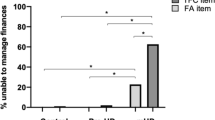Abstract
Introduction
Although most patients with schizophrenia rely on state financial support, little is known about their expenses and how they use the money at their discretion. However, the ability to budget is a predictive factor in rehabilitation. An assessment of financial management skills could make it possible to develop more appropriate psycho-social assistance.
Method
Fifty-seven outpatients with schizophrenia treated in the public sector in Geneva, Switzerland took part in the study. Psychosocial, diagnostic, neurocognitive and symptomatological measures were collected. Data were gathered on patients’ incomes and quality of life. A prospective analysis of their expenses during a 1-month period was also performed.
Results
Median income was 4,125 Swiss francs per month (i.e., 3,372 US dollars). After paying fixed expenses (which were handled with or without the assistance of a representative payee), a mean of 400 Swiss francs remained at their disposal to use as they wished. Seventy-two percent of this money was devoted to the use of psychoactive substances (e.g., cigarettes, alcohol, cannabis) or various drinks in coffee houses, and 28% on leisure activities (trips, sports and other recreational activities). Eighty-four percent of patients would have liked to have more money for leisure activities. The study was well-accepted and led to modification of the treatment plan in 84% of cases.
Conclusion
Most of the discretionary money patients received was used for buying substances with addictive properties; this may hinder the practice of activities favouring recovery. Thus, it appears essential to guide patients in the management of their budgets.
Similar content being viewed by others
References
Affleck J, Mc Guire R (1984) Morningside rehabilitation status scale (MRSS). Brit J Psychiatry 145:517–526
APA (1994) Diagnostic and Statistical Manual of Mental Disorders. In: American Psychiatric Association, Washington DC
Drake RE, Bartels SJ, Teague GB, Noordsy DL, Clark RE (1993) Treatment of substance abuse in severely mentally ill patients. J Nerv Ment Dis 181:606–611
Elbogen EB, Soriano C, Van Dorn R, Swartz MS, Swanson JW (2005) Consumer views of representative payee use of disability funds to leverage treatment adherence. Psychiatr Serv 56:45–49
Estroff SE, Zimmer C, Lachicotte WS, Benoit J (1994) The influence of social networks and social support on violence by persons with serious mental illness. Hosp Community Psychiatry 45:669–679
Foldemo A, Ek AC, Bogren L (2004) Needs in outpatients with schizophrenia, assessed by the patients themselves and their parents and staff. Soc Psychiatry Psychiatr Epidemiol 39:381–385
Frank JB, Degan D (1997) Conservatorship for the chronically mentally ill: review and case series. Int J Law Psychiatry 20:97–111
Grossman LS, Willer JK, Miller NS, Stovall JG, McRae SG, Maxwell S (1997) Temporal patterns of veterans’ psychiatric service utilization, disability payments, and cocaine use. J Psychoactive Drugs 29:285–290
Gutiérrez-Maldonado J, Caqueo-Urízar A, Kavanagh DJ (2005) Burden of care and general health in families of patients with schizophrenia. Soc Psychiatry Psychiatr Epidemiol 40:899–904
Health NIoM (1976) CGI clinical global impressions. In: ECD-EU assessment for psychopharmacology. Rockville
Herrman H, Hawthorne G, Thomas R (2002) Quality of life assessment in people living with psychosis. Soc Psychiatry Psychiatr Epidemiol 37:510–518
Huguelet P, Mohr S, Boucherie M, Dupont-Willemin S, Ferrero F, Borras L (submitted) Patients with schizophrenia and their finances: what they earn and own
Kay S, Fiszbein A, Opler L (1992) Positive and negative syndrome scale. USA
Kouzis AC, Eaton WW (2000) Psychopathology and the initiation of disability payments. Psychiatr Serv 51:908–913
Leplège A, Réveillère C, Ecosse E, Caria A, Rivière H (2000) Propriétés psychométriques d’un nouvel instrument d’évaluation de la qualité de vie, le WHOCOL-26, à partir d’une population de maladies neuromusculaires. Encéphale 26:13–22
Luchins DJ, Roberts DL, Hanrahan P (2003) Representative payeeship and mental illness: a review. Adm Policy Ment Health 30:341–353
Marson DC, Briggs S (2001) Assessing competency in Alzheimer’s disease: treatment consent capacity and financial capacity. In: Gauthier S, Cummings JL (ed) Alzheimer’s Disease and Related Disorders Annual 2001. Martin Dunitz Ltd, London
Marson DC, Sawrie SM, Snyder S, McInturff B, Stalvey T, Boothe A, Aldridge T, Chatterjee A, Harrell LE (2000) Assessing financial capacity in patients with Alzheimer disease: a conceptual model and prototype instrument. Arch Neurol 57:877–884
Murphy B, Herrman H, Hawthorne G, Pinzone T, Evert H (2000) Australian WHOQOL instruments: user’s and interpretation guide. Australian WHOQOL Field Study Centre, Melbourne, Australia
Nelson H (1982) Adult Reading Test (NART): test manual. Windsor, UK
OMS (1994) Classification Internationale des Maladies CIM-10 / ICD-10. Paris
Presly AS, Grubb AB, Semple D (1982) Predictors of successful rehabilitation in long-stay patients. Acta Psychiatr Scand 66:83–88
Ries RK, Dyck DG, Short R, Srebnik D, Fisher A, Comtois KA (2004) Outcomes of managing disability benefits among patients with substance dependence and severe mental illness. Psychiatr Serv 55:445–447
Rosen MI, Rosenheck R (1999) Substance use and assignment of representative payees. Psychiatr Serv 50:95–98
Rosen MI, Rosenheck RA, Shaner AL, Eckman TA, Gamache GR, Krebs CW (2002) Substance abuse and the need for money management assistance among psychiatric inpatients. Drug Alcohol Depend 67:331–334
Rosenheck R, Lam J, Randolph F (1997) Impact of representative payees on substance use by homeless persons with serious mental illness. Psychiatr Serv 48:800–806
Shaner A, Eckman TA, Roberts LJ, Wilkins JN, Tucker DE, Tsuang JW, Mintz J (1995) Disability income, cocaine use, and repeated hospitalization among schizophrenic cocaine abusers–a government-sponsored revolving door? N Engl J Med 333:777–783
Steinberg ML, Williams JM, Ziedonis DM (2004) Financial implications of cigarette smoking among individuals with schizophrenia. Tob Control 13:206
Wilson BA, Alderman N, Burgess PW, Emslie H, Evans JJ (1996) Behavioural assessment of the Dysexecutive Syndrome. Thames Valley Test Company, England
Zanello A, Weber Rouget B, Gex-Fabry M, Maercker A, Guimon J (2006) Validation of the QFS measuring the frequency and satisfaction in social behaviours in psychiatric adult population. Encephale 32:45–59
Author information
Authors and Affiliations
Corresponding author
Rights and permissions
About this article
Cite this article
Borras, L., Mohr, S., Boucherie, M. et al. Patients with schizophrenia and their finances: how they spend their money. Soc Psychiat Epidemiol 42, 977–983 (2007). https://doi.org/10.1007/s00127-007-0257-1
Received:
Accepted:
Published:
Issue Date:
DOI: https://doi.org/10.1007/s00127-007-0257-1




